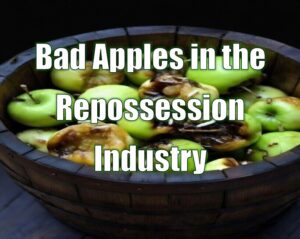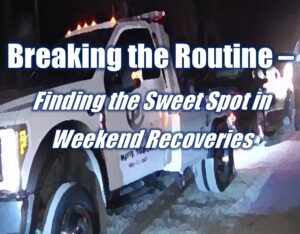EDITORIAL REBUTTAL
I read your editorial regarding Santander/Chrysler and I would like to take this opportunity to respond to parts of it. I have known Joe Taylor and Stamatis Ferarolis for more years than I can remember and I totally agree with what your editorial said about them so we will leave that where it is.
The two things I want to respond to is contingency and certification and I mean real professional certification. I read the article Joe Taylor wrote 2 or 3 years ago about contingency and what he said was “Contingency, in and of itself is not the primary culprit. The problem lies in the fact that lenders contract contingency services at the same rate an non-contingency services.” The article went on to say that lawyers who represent clients on a contingency basis usually charge a minimum of thirty percent of the awards.
Now, he didn’t mean that we recovery agents should charge thirty percent of the sale price of the “metal” we bring in but rather, a fee that would allow us to service that contingency assignment at a rate that would allow a professional to do any extra work in a safe and professional manner that would address the safety of the recovery agent and still maintain public safety and many, many contingency assignments certainly take some extra work. I know this is what he meant because I spoke to him about this when I read the article. So, I agree that contingency is not the real problem but what recovery agents are paid for working contingency assignments. In fact, I do work for a contingency client now and glad to do so, because they pay me a fair fee!
Regarding professional certification, I spoke to Stamatis and I also did a little Texas digging” and here is what I found. The C.A.R.S. National Certification Program was introduced to the recovery industry and the lending industry in September of 1999 so it has been vetted by the recovery industry, the lending community and courts across the country for the past 17 years by these folks. There are over 8,500, yes, 8,500 graduates of the C.A.R.S. Program and more than 1,500 graduates of the C.A.R.S. Continuing Education courses. The C.A.R.S. Program and Continuing Education courses are accepted in all 50 states and courts across the country has accepted the C.A.R.S. Program as proof of professional competency. I’d say that’s some pretty damn good vetting.
I checking on two of the other programs that claim the “certification” title. One had tested only 300 recovery agents in a two-year period. The other one has only two clients and has a “check box” for the answers and can be done in about 30 minutes.
Here is what I believe is a fair question and I think, a good comparison. Let’s say you are in the corporate world (and Santander/Chrysler certainly is) and you are looking to hire someone for a demanding job. And let’s say you have two applicants; one has a 4-year degree from Yale or Harvard and the other one from a state university. Which one are you going to choose? I’m not comparing the C.A.R.S. Program to a 4-year degree from Yale or Harvard but you can see where I’m coming from. There is just no comparison between the C.A.R.S. Program and any other “training” or “certification” program out there so you should be able to see why Santander/Chrysler chose the C.A.R.S. Santander chose the industry standard as it met all the qualifications they wanted in a program. You all are griping about having the other programs accepted but I ask why were those programs written in the first place? Did the industry need 4 more programs written within the last two years?
While I was visiting with Stamatis I learned a couple more things of interest about RISC. They have 30 lenders under contract where they do the vetting of the recovery agency so one lot inspection satisfies those 30 lenders. So, you don’t have to pay for half a dozen lot inspections by half a dozen different inspection companies. Saves you a lot of money. I’m told RISC will handle over 6,000 lot inspections this year. So, if we’re looking for a reduction of wasted time why wouldn’t we want to choose the industry standard that 30 clients have accepted? Personally, I’d rather only be vetted once so clients don’t make me fill out needless questionnaires. Another “biggie” in my opinion is the RISC Compliance and Operations Manual. It is very helpful in helping recovery agency owners meet the current compliance mandates of lenders and the CFPB.
I don’t know about the rest of you who are reading this article but I can tell you that I want to be the best recovery agency out there so I’m going to do business with the best and most qualified provider of services I can find.
Y’all have a good day,
Bryan McCollister
Faith Financial











More Stories
Bad Apples in the Repossession Industry
Why Self-Help Repossession Is Taken for Granted — and Why Losing It Would Hurt Consumers Most
A Necessary Distinction: Financial Oversight vs. Financial Control
When Oversight Becomes Overreach: Why Demanding Subcontractor Financials Is Wrong
Snitching vs. Standing on Principle: Calling Out Bad Actors in the Repossession Industry
Lender Interference in Georgia Repossessions